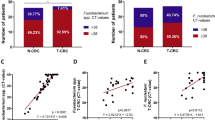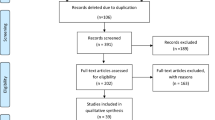Abstract
Background
Colorectal cancer (CRC) is a global health problem. The gut microbiome is now recognized as an important underlying factor to the initiation and progression of CRC. Fusobacterium nucleatum (FN) is one of the most studied bacteria in the aetiology of CRC. This study provided cohort evidence on the association of FN infection with clinicopathologic features in CRC patients.
Methods
We analysed the cancerous and adjacent non-cancerous formalin-fixed paraffin embedded (FFPE) tissue of 83 CRC patients from a single medical centre in Malaysia. TaqMan probe-based qPCR targeting the 16S rRNA gene was used to detect the presence of FN in the extracted FFPE DNA. The differences in FN expression between cancer and non-cancer tissues were evaluated. Association studies between FN infection in the tumour and relative FN abundance with available clinical data were conducted.
Results
FN was more abundant in the cancerous tissue compared to non-cancerous tissue (p = 0.0025). FN infection in the tumour was significantly associated with lymph node metastasis (p = 0.047) and cancer staging (p = 0.032), but not with other clinicopathologic variables. In double-positive patients where FN was detected in both cancerous and non-cancerous tissue, the expression fold-change of FN, calculated using 2-ΔΔCT formula, was significantly higher in patients with tumour size equal to or greater than 5 cm (p = 0.033) and in KRAS-mutated patients (p = 0.046).
Conclusions
FN is enriched in CRC tumour tissue and is associated with tumour size, lymph node metastasis, cancer staging, and KRAS mutation in this single-centre small cohort study.



Similar content being viewed by others
Data availability
All data supporting the findings of this study are available within the paper.
References
Morgan E, Arnold M, Gini A, Lorenzoni V, Cabasag CJ, Laversanne M, Vignat J, Ferlay J, Murphy N, Bray F (2023) Global burden of Colorectal cancer in 2020 and 2040: incidence and mortality estimates from GLOBOCAN. Gut 72(2):338–344. https://doi.org/10.1136/gutjnl-2022-327736
Azizah AM, Hashimah B, Nirmal K, Siti Zubaidah AR, Puteri NA, Nabihah A, Sukumaran R, Balqis B, Nadia SMR, Sharifah SSS, Rahayu O, Nur Alham O, Azlina AA (2019) Malaysia National Cancer Registry Report 2012–2016. National Cancer Institute, Ministry of Health, Malaysia
Pang SW, Awi NJ, Armon S, Lim WWD, Low JSH, Peh KB, Peh SC, Teow SY (2023) Current update of laboratory molecular diagnostics advancement in management of Colorectal cancer. Advanced in medical imaging, detection, and diagnosis. Jenny Stanford Publishing, Dubai, pp 567–595
White MT, Sears CL (2023) The microbial landscape of colorectal cancer. Nat Rev Microbiol 2023
Li S, Liu J, Zheng X, Ren L, Yang Y, Li W, Fu W, Wang J, Du G (2022) Tumorigenic bacteria in Colorectal cancer: mechanisms and treatments. Cancer Biol Med 19(2):147–162. https://doi.org/10.20892/j.issn.2095-3941.2020.0651
Han YW (2015) Fusobacterium nucleatum: a commensal-turned pathogen. Curr Opin Microbiol 23:141–147. https://doi.org/10.1016/j.mib.2014.11.013
Yang NY, Zhang Q, Li JL, Yang SH, Shi Q (2014) Progression of periodontal inflammation in adolescents is associated with increased number of Porphyromonas gingivalis, Prevotella intermedia, Tannerella forsythensis, and Fusobacterium nucleatum. Int J Paediatr Dent 24:226–233. https://doi.org/10.1111/ipd.12065
Kostic AD, Chun E, Robertson L, Glickman JN, Gallini CA, Michaud M, Clancy TE, Chung DC, Lochhead P, Hold GL, El-Omar EM, Brenner D, Fuchs CS, Meyerson M, Garrett WS (2013) Fusobacterium nucleatum potentiates intestinal tumorigenesis and modulates the tumor-immune microenvironment. Cell Host Microbe 14:207–215. https://doi.org/10.1016/j.chom.2013.07.007
Ma CT, Luo HS, Gao F, Tang QC, Chen W (2011) Fusobacterium nucleatum promotes the progression of Colorectal cancer by interacting with e-cadherin. Oncol Lett 16:2606–2612. https://doi.org/10.3892/ol.2018.8947
Fardini Y, Wang X, Témoin S, Nithianantham S, Lee D, Shoham M, Han YW (2011) Fusobacterium nucleatum adhesin FadA binds vascular endothelial cadherin and alters endothelial integrity. Mol Microbiol 82:1468–1480. https://doi.org/10.1111/j.1365-2958.2011.07905.x
Rubinstein MR, Wang X, Liu W, Hao Y, Cai G, Han YW (2013) Fusobacterium nucleatum promotes colorectal carcinogenesis by modulating E-cadherin/β-catenin signaling via its FadA adhesin. Cell Host Microbe 14:195–206. https://doi.org/10.1016/j.chom.2013.07.012
Zhang S, Yang Y, Weng W, Guo B, Cai G, Ma Y, Cai S (2019) Fusobacterium nucleatum promotes chemoresistance to 5-fluorouracil by upregulation of BIRC3 expression in Colorectal cancer. J Exp Clin Cancer Res 38:14. https://doi.org/10.1186/s13046-018-0985-y
Tahara T, Hirata I, Nakano N, Tahara S, Horiguchi N, Kawamura T, Okubo M, Ishizuka T, Yamada H, Yoshida D, Ohmori T, Maeda K, Komura N, Ikuno H, Jodai Y, Kamano T, Nagasaka M, Nakagawa Y, Tuskamoto T, Urano M, Shibata T, Kuroda M, Ohmiya N (2017) Potential link between Fusobacterium enrichment and DNA methylation accumulation in the inflammatory colonic mucosa in ulcerative Colitis. Oncotarget 8:61917–61926. https://doi.org/10.18632/oncotarget.18716
Lee DW, Han SW, Kang JK, Bae JM, Kim HP, Won JK, Jeong SY, Park KJ, Kang GH, Kim TY (2018) Association between Fusobacterium nucleatum, pathway mutation, and patient prognosis in Colorectal cancer. Ann Surg Oncol 25:3389–3395. https://doi.org/10.1245/s10434-018-6681-5
Awi NJ, Yap HY, Armon S, Low JSH, Peh KB, Peh SC, Lee CS, Teow SY (2023) Association between autophagy and KRAS mutation with clinicopathological variables in colorectal cancer patients. Malays J Pathol 43(2):269–279
Kebschull JM, Zador AM (2015) Sources of PCR-induced distortions in high-throughput sequencing data sets. Nucleic Acids Res 43:e143. https://doi.org/10.1093/nar/gkv717
Li YY, Ge QX, Cao J, Zhou YJ, Du YL, Shen B, Wan YJY, Nie YQ (2016) Association of Fusobacterium nucleatum Infection with Colorectal cancer in Chinese patients. World J Gastroenterol 22:3227–3233. https://doi.org/10.3748/wjg.v22.i11.3227
Sun Y, An QM, Tian XY, Wang ZL, Guan XY, Dong B, Zhao M, Hao CY (2016) Fusobacterium nucleatum Infection is correlated with Tumor Metastasis and postoperative survival of colorectal cancer patients in China. Transl Cancer Res 5. https://doi.org/10.21037/tcr.2016.10.45
Wong SH, Kwong TNY, Chow TC, Luk AKC, Dai RZW, Nakatsu G, Lam TYT, Zhang L, Wu JCY, Chan FKL, Ng SSM, Wong MCS, Ng SC, Wu WKK, Yu J, Sung JJY (2017) Quantitation of faecal Fusobacterium improves faecal immunochemical test in detecting advanced colorectal neoplasia. Gut 66:1441–1448. https://doi.org/10.1136/gutjnl-2016-312766
Chen Y, Lu Y, Ke Y, Li Y (2019) Prognostic impact of the Fusobacterium nucleatum status in colorectal cancers. Medicine 98:e17221. https://doi.org/10.1097/md.0000000000017221
Proença MA, Biselli JM, Succi M, Severino FE, Berardinelli GN, Caetano A, Reis RM, Hughes DJ, Silva AE (2018) Relationship between Fusobacterium nucleatum, inflammatory mediators and microRNAs in colorectal carcinogenesis. World J Gastroenterol 24:5351–5365. https://doi.org/10.3748/wjg.v24.i47.5351
Ito M, Kanno S, Nosho K, Sukawa Y, Mitsuhashi K, Kurihara H, Igarashi H, Takahashi T, Tachibana M, Takahashi H, Yoshii S, Takenouchi T, Hasegawa T, Okita K, Hirata K, Maruyama R, Suzuki H, Imai K, Yamamoto H, Shinomura Y (2015) Association of Fusobacterium nucleatum with clinical and molecular features in colorectal serrated pathway. Int J Cancer 137:1258–1268. https://doi.org/10.1002/ijc.29488
Wang N, Fang J-Y (2023) Fusobacterium nucleatum, a key pathogenic factor and microbial biomarker for Colorectal cancer. Trends Microbiol 31(2):159–172. https://doi.org/10.1016/j.tim.2022.08.010
Ou S, Wang H, Tao Y, Luo K, Ye J, Ran S, Guan Z, Wang Y, Hu H, Huang R (2022) Fusobacterium nucleatum and Colorectal cancer: from phenomenon to mechanism. Front Cell Infect Microbiol 12. https://doi.org/10.3389/fcimb.2022.1020583
Acknowledgements
S-W Pang is the recipient of Sunway University Postgraduate’s Degree by Research Studentship. We also thank Wenzhou-Kean University for continuously supporting the research work.
Funding
This research was funded by Sunway University Internal Grant 2020 (GRTIN-RSF-SHMS-DMS-03-2020) and partly supported by Sunway Medical Centre Research Fund (SRC/002/2017/FR and SRC/003/2017/FR).
Author information
Authors and Affiliations
Contributions
Material preparation and data collection were performed by SWP. The first draft of the manuscript was written by SWP. SCP and SYT edited the manuscript. All authors reviewed and edited the manuscript.
Corresponding author
Ethics declarations
Ethics approval
This study was performed in line with the principles of the Declaration of Helsinki. Ethical approval for this study was granted from Sunway University Research Ethics Committee (PGSUREC 2018/052) and Sunway Medical Centre Independent Research Ethics Committee (013/2017/ER). Archived FFPE tissue blocks of CRC patients from year 2013 to 2015 were used in this project. The written informed consent was waived with the approval of the Institutional Review Board (IRB).
Competing interests
The authors declare no competing interests.
Additional information
Publisher’s Note
Springer Nature remains neutral with regard to jurisdictional claims in published maps and institutional affiliations.
Rights and permissions
Springer Nature or its licensor (e.g. a society or other partner) holds exclusive rights to this article under a publishing agreement with the author(s) or other rightsholder(s); author self-archiving of the accepted manuscript version of this article is solely governed by the terms of such publishing agreement and applicable law.
About this article
Cite this article
Pang, SW., Armon, S., Chook, J. et al. Association of Fusobacterium nucleatum infection with the clinicopathological characteristics in colorectal cancer patients. Mol Biol Rep 51, 124 (2024). https://doi.org/10.1007/s11033-023-09150-5
Received:
Accepted:
Published:
DOI: https://doi.org/10.1007/s11033-023-09150-5




